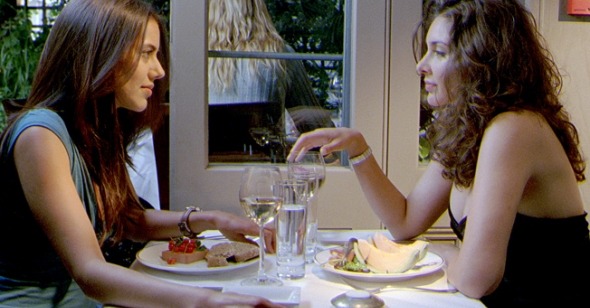Dull Flame
by Chris Wisniewski
I Can't Think Straight
Dir. Shamim Sharif, U.S., Regent Releasing
You would think that a cross-cultural, cross-religious lesbian romance should have enough built-in conflict to sustain an 80-minute feature, but Shamim Sarifâs I Can't Think Straight slumps and stretches its way from its first uninspired set piece, an engagement party for Jordanian-Christian Tala (Lisa Ray), to its mildly embarrassing closing montage, cut to, natch, Jill Sobuleâs âI Kissed a Girlâ (hello, 1995!). As with her other feature, The World Unseen (released to theaters earlier this month), Sarif adapts and directs her own novel here, with Ray and Sheetal Sheth playing the lead roles. For I Canât Think Straight, she enlists the help of co-writer Kelly Moss, but to no avail: Sarif has crafted a movie with such paper-thin characterizations and so lacking in dramatic incident that itâs frankly surprising that she was working from a novel at allâmuch less one she wrote herself.
As the movie opens, Tala finds herself betrothed for the fourth time, after having broken three previous engagements on or near the scheduled wedding days. Her wealthy Christian parents throw her an elaborate engagement party, after which she leaves Jordan for London, where she meets Leyla (Sheth), the guarded Indian-Muslim girlfriend of her friend Ali (Rez Kempton). During their first encounter, Tala immediately shakes up Leylaâs world with some banal provocations about religion. The next day, after a breathy, strenuous tennis match, itâs clear the two have kindled a romanceâthough they remain ostensibly oblivious to their nascent feelings.
Tala reads some of Leylaâs prose and pronounces her a Major Talent; Leyla begs her parents to let her spend a weekend with Tala at Oxford. At this point, Leylaâs spunky sister registers Leylaâs excitement, notices her k.d. lang CDs (seriously), and puts two and two together. Yet Leyla refuses to acknowledge her sapphic desires until her Oxford weekend culminates in a sensual dance turned, in a flurry of rapid cuts and awkward close-ups, to soft kisses and heavy petting.
After their Oxford encounter their roles reverse, with bashful Leyla staking a bold claim to Talaâs affection and her brash lover cracking under the pressure of social propriety. Tala insists on the impossibility of living as lesbians in their respective cultures, and indeed, both women are particularly burdened by unforgiving mothers who seem to embody those cultural constraints. Leylaâs clings to tradition, mostly in the form of food. When one of her daughters makes Ethiopian bread, she counters, âWe have Indian bread right here,â while brandishing some naan. Talaâs mother, meanwhile, is essentially the villain. As the movie opens, she snaps at one of her servants, âIf I want your opinion, Iâll give it to you!â After the Oxford weekend, she flies Talaâs fiance in to drive a wedge between her daughter and Leyla.
Despite the relative demonization of both mothers, all the talk of the cultural consequences of queerness never actually yields dramatic payoff. Tala and Leyla come out to their parents in fleeting scenes that are played mostly for laughs, and afterwards, Sarif drops those narrative threads almost completely. I Canât Think Straight is pretty much a comedyâalbeit not a very funny oneâand while thereâs nothing wrong, in principle, with the lightness of its touch, its pat comedic resolution, after so much hemming and hawing from Tala, ends up feeling glib. The filmâs tone problems are compounded by Sarifâs unimaginitive visual sensibility and heavy reliance on montage to cover dramatic ellipses and elisions. Still, if I Canât Think Straight isnât very goodâand frankly, it isnâtâit is, at the very least, mostly inoffensive.
